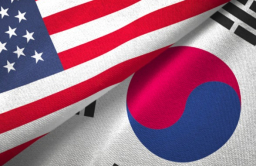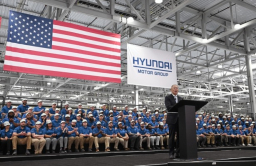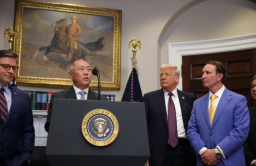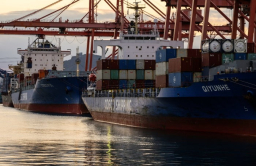-
KOSPI 2812.05 +41.21 +1.49%
-
KOSDAQ 756.23 +6.02 +0.80%
-
KOSPI200 376.54 +6.64 +1.80%
-
USD/KRW 1373 3.00 -0.22%
Asian manufacturing activity stumbles again under weight of Trump tariffs
Economy
Asian manufacturing activity stumbles again under weight of Trump tariffs
May PMI surveys contained some cautiously upbeat signs
By
Jun 04, 2025 (Gmt+09:00)
3
Min read
News+

The latest set of S&P Global purchasing managers indexes showed another pullback in manufacturing last month amid trade policy worries and subdued demand.
Major exporting economies such as Taiwan, South Korea and Vietnam saw sharp declines in new orders during the month, continuing the downward momentum since the Trump administration announced tariffs on dozens of countries in April.
A series of policy U-turns since then—including a trade truce between China and the U.S.—have offered some relief, but also muddied the outlook, leaving businesses hesitant to spend as they question what lies ahead.
The May PMI for Taiwan showed that firms remained downbeat, expecting production to keep falling on deteriorating customer demand and a lack of clarity on how trading conditions will look in the near future, said Annabel Fiddes, economics associate director at S&P Global Market Intelligence. Weak demand led companies to cut prices at the fastest rate in nearly two years, Fiddes said.
In South Korea, the S&P data signaled the sharpest fall in new orders since June 2020 during the Covid-19 pandemic. Businesses attributed the decline in part to the impact of higher U.S. tariffs on the domestic market as well as on key export markets, said Usamah Bhatti, economist at S&P Global Market Intelligence.
While firms in the region continued to hold back on purchasing activity and reduced inventory, there were some cautiously upbeat signs in the May surveys, likely reflecting the temporary truce struck between China and the U.S. midway through the month, which soothed concerns about a wide trade war.
Hiring picked up in South Korea amid tentative hopes that global trade would settle, and the domestic economy would improve. Employment also increased in Japan, the au Jibun Bank PMI showed, as manufacturers sought to build capacity in anticipation of improvements in global demand conditions.
Businesses in Japan noted that subdued global demand due to U.S. tariffs and increased client hesitancy hurt new orders and production schedules, but there were cautious signs of potential improvement over the coming year, Fiddes said.
India stood out as a likely beneficiary of supply chain adjustments, with new export orders rising at one of the strongest rates in three years in May, the data showed. Manufacturers in India highlighted strong demand from Asia, Europe, the Middle East and the U.S.
Official PMI data for China—which has borne the brunt of the Trump administration’s tariff spree—also showed an improvement in manufacturing activity in May. But the reading remained in contraction territory, showing the impact of lingering uncertainties.
“Many of the orders that have resumed production recently were placed before the imposition of tariffs, and factories are reporting decreasing overall new orders as their U.S. customers remain worried about potential changes” after the 90-day pause on so-called reciprocal tariffs expires, Barclays economists wrote in a report.
Markets are closely watching developments after a U.S. court last week ruled that most of Trump’s tariffs on countries aren’t legal—a decision that was promptly appealed—and as tensions with China escalate.
“Fresh hostilities between the U.S. and China show that the many questions left hanging after the Geneva cease-fire in mid-May still have no satisfactory answers,” said Gavekal Research’s Arthur Kroeber.
Write to Kimberley Kao at kimberley.kao@wsj.com
More To Read
-
May 04, 2025 (Gmt+09:00)
-
 Business & PoliticsSeoul, Washington agree on July tariff deal framework in '2+2' trade talks
Business & PoliticsSeoul, Washington agree on July tariff deal framework in '2+2' trade talksApr 25, 2025 (Gmt+09:00)
-
Apr 24, 2025 (Gmt+09:00)
-
Apr 23, 2025 (Gmt+09:00)
-
 Business & PoliticsSamsung, LG review strategies as Trump slaps Vietnam with steeper tariffs
Business & PoliticsSamsung, LG review strategies as Trump slaps Vietnam with steeper tariffsApr 03, 2025 (Gmt+09:00)





